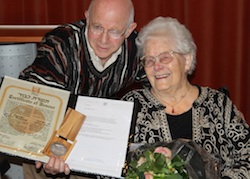By Alice Kaderlan , Special to JTNews
Although people knowledgeable about the Holocaust are often familiar with the collaborationist history of France, the story of how the Dutch cooperated with the Germans has rarely been told. At the same time, the size and effectiveness of the Dutch resistance has been exaggerated, as has the role and number of those who helped Dutch Jews.
The truth is that 25,000 Dutch stepped forward as Waffen SS volunteers and Dutch authorities executed almost all German orders without protest. Only 25 percent of Dutch Jews survived the war and of the 24,000 Jews who were hidden, 8,000 were ultimately betrayed. Most, like Anne Frank and her mother and sister, died in the camps. But a few remarkable Dutch families, like Jan and Martje Rosier, successfully hid Jews and enabled them to survive the war.
In the Rosiers’ case, they not only kept 20-year-old Jozeph de Haan safe on their farm for 16 months, they completely accepted de Haan into their family, giving him the name of Villem, by which the Rosiers’ descendants still call him.
Today, 90-year-old Jozeph lives in Australia. His son, Michael de Haan of Seattle, is determined that the story of Jozeph and the Rosiers become an official part of Holocaust history. Michael worked doggedly for months to have the Rosiers designated “Righteous Among the Nations,” the State of Israel’s honorific for non-Jews who risked their lives to save Jews from extermination. As a result, the Rosiers’ names are now inscribed at Yad Vashem and Michael recently traveled to the Netherlands for a local recognition ceremony.
Although Jan and Martje are no longer living, their daughter and successive generations of the family were on hand last month to accept honors from the mayor of the town where the Rosier farm was located and from representatives of Yad Vashem and the Israeli Embassy.
“What moved me the most,” said Michael, “was hearing the citation read out in Hebrew. It caught me by surprise and I couldn’t understand why. But then I realized deep down what this recognition meant. Were it not for the righteous, for people like the Rosier family, perhaps there never would have been an Eban, a Golda or a Dayan.”
Michael has reconstructed the story of his father’s escape from his native Amsterdam to the Rosier farm in Friesland, one of the northernmost provinces of Holland. In Amsterdam, Jozeph had managed to avoid the regular roundups of Jews and by September of 1943 was the only member of his immediate family who hadn’t been deported, and who ultimately survived.
With his family gone, there was no reason for Jozeph to stay in Amsterdam; he was able to get to Friesland where other Jews were being hidden and in the next several weeks moved from farm to farm, narrowly escaping arrest by the Gestapo, before winding up at the Rosiers’s property.
The Rosiers and the two sons still at home embraced him as their own. Over the following 16 months, he became an integral part of the household, milking the cows, helping around the house, and even spinning wool. Apart from going into the barn (which was attached to the house) to milk the cows, Jozeph was confined to the house except for 10 minutes each night when he would go for a brisk walk; when anyone came to the house, he hid in the space under the roof where he slept. On two occasions German soldiers, came looking for food but the Rosiers pretended they couldn’t understand German and sent them on their way empty-handed, knowing that if they fed the soldiers, they would keep returning.
After the war, Jozeph married and with his new wife moved to South Africa, where Michael was born. Over the years, Jozeph corresponded with the Rosiers and, later, their children and grandchildren. But it wasn’t until 2010 that Jozeph returned to Friesland with his immediate family, including Michael. Although Jan and Martje were deceased, the remaining Rosiers welcomed them like family and it was partly that reception that convinced Michael he wanted to see Jan and Martje recognized among the righteous.
Because secrecy was essential for safety during the war years, Jozeph never said he was Jewish and the Rosiers never asked. Non-Jews escaping the German labor draft also hid in The Netherlands, but Jozeph believes the Rosiers did assume he was Jewish.
As for why they did what they did, the only time the subject was broached was during the de Haan family’s 2010 visit to Friesland. Michael was in a car with Ypie, a Rosier granddaughter, and Ypie’s sister-in-law Bettie. He asked about Jan’s motivations and their answer mirrored the one Miep Gies always gave when asked why she helped Anne Frank’s family.
“Bettie looked at Ypie and Ypie looked at Bettie quizzically,” Michael remembers. “The answer was, well, obvious. It was just the right thing to do. And then we moved on to the next topic of conversation.”
Michael also succeeded in getting another family, the Dreijers, designated as Righteous Among the Nations. Klaas Dreijer kept Jozeph safe in Friesland for many weeks before taking him to the Rosier farm for the duration of the war. This spring, Michael will travel to Ottawa, Ont., where Dreijer descendants now live, for a similar recognition ceremony.
